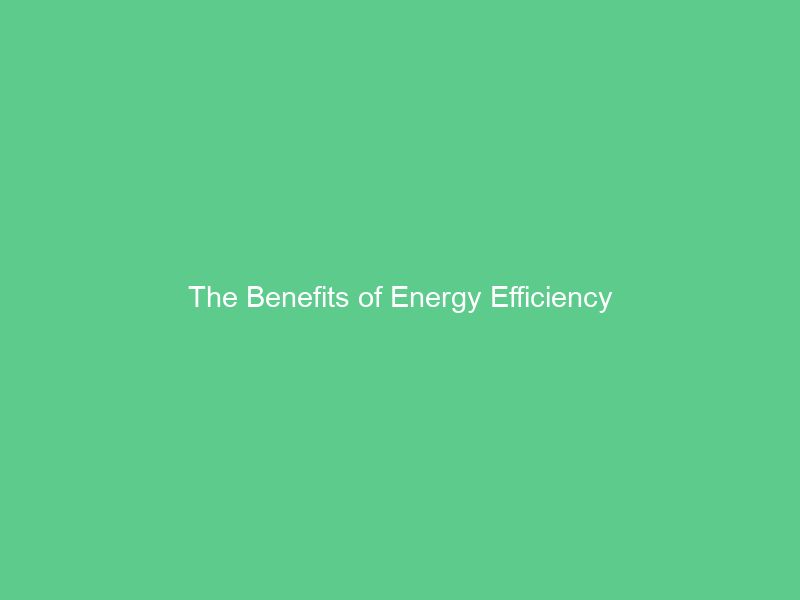Energy efficiency is the measure of how much useful energy a piece of equipment or system produces relative to how much it consumes; calculated by dividing energy input by output.
Companies that adopt energy-efficient policies and practices are positioned for success in multiple ways. By protecting themselves against rising energy prices while decreasing carbon usage, energy efficient businesses stand a better chance at meeting business goals and succeeding.
Reduced Costs
Energy efficiency benefits consumers and businesses by decreasing utility bills, freeing up household and business disposable income, helping businesses keep more of their profits, and decreasing operating costs for public services like schools and hospitals. Energy efficient buildings and transportation systems also lower fuel costs for all parties involved – businesses, households and governments alike.
Energy-saving technologies, including light bulbs and appliances that bear the ENERGY STAR label, insulation, and smart thermostats can lower electricity bills by 10-50% or more. Deep retrofits in homes, commercial properties, public buildings, district heating/cooling networks and transportation (such as bus rapid transit or electric micromobility systems) may offer similar savings.
Energy efficiency investments also cost less per unit than new generation, helping to mitigate price volatility by reducing overall demand and thus creating reliable, affordable electricity access for families experiencing energy insecurity who must choose between paying their energy bill or purchasing food for themselves.
Reduced Emissions
Energy efficiency not only saves costs but also decreases greenhouse gas (GHG) emissions from burning fossil fuels, contributing to climate change and air pollution – which has been linked with numerous health conditions including heart disease and respiratory illness. Investment in energy efficient products and practices as well as employee awareness training is vital in helping companies to minimize their environmental footprint and save the environment.
Globally, energy efficiency improvements offer immense potential to reduce greenhouse gas (GHG) emissions at minimal cost and meet climate and energy goals, such as those set out in 2020’s Global Goal to reach net zero by 2050 — or earlier. These investments may help meet climate and energy goals with regard to climate action as well as emissions reduction goals such as 2050 Net Zero goal set forth by UNFCCC.
Energy efficiency is integral to this goal as it helps lower consumption and costs while deferring costly supply investments that keep future energy prices high. Energy efficiency also allows renewable energy technologies to be deployed more rapidly by lowering overall demand and making renewable sources more cost-effective. Furthermore, efficiency enhances social determinants of health such as housing quality/affordability/burden (the percentage of household income spent on energy), home comfort and social determinants of health (ie the ability of residents to remain comfortable).
Increased Productivity
Energy efficiency allows businesses to produce more goods with limited resources. This can result in improved living standards and trade with other countries.
Low energy costs have the ability to increase household disposable income and boost revenue for businesses while decreasing operating costs at schools and hospitals. Energy efficiency also has a profound effect on greenhouse gas emissions by decreasing fossil fuel use – producing greenhouse gases as well as other harmful pollutants – through reduced use.
Energy efficiency provides many obvious advantages, lowering electricity costs for households and other users while simultaneously decreasing peak power usage during peak times (peak shaving) or shifting consumption to non-peak times such as weekends or late night usage (load shifting), helping reduce system peak demand. Energy efficiency investments often cost much less than building new power plants; however market failures like perverse incentives or lack of information may impede its benefits from realizing them fully.
Increased Shareholder Value
Many energy-saving practices and technologies reduce energy usage while providing the same service, such as lighting or heating/cooling. For example, an energy efficient ductless air-conditioning heat pump uses half the energy consumed by standard air conditioners to deliver equivalent cooling output – this allows companies to serve more customers with limited resources while simultaneously reaching additional goals like profitability, sustainability or economic expansion.
Though efficiency upgrades often cost more up front, they generate savings that quickly pay for themselves over time and may increase property values upon resale. They can also lower energy bills and energy costs for consumers.
While shareholder value remains a core principle for modern corporations, other ways exist to balance it with environmental and social responsibilities. One such alternative is sustainable and responsible growth strategies which encourage an holistic approach to business management that considers stakeholder interests; further enhanced with cutting-edge technologies like smart grids which increase energy efficiency while simultaneously decreasing environmental impacts from energy production.

